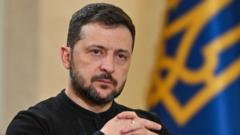Ukrainian President Volodymyr Zelensky finds himself at a challenging crossroads as the United States has halted its military aid to Ukraine following a tense Oval Office meeting with President Donald Trump last Friday. The implications of this pause in aid have left Zelensky with limited choices, with some voices, including Republican Senator Lindsey Graham, suggesting that he should either resign or adjust his approach to strengthen ties with the US.
Following a particularly fraught meeting, where Trump bluntly communicated to Zelensky that Ukraine was not in a position of strength, options for reconciliation have become a primary focus. A rumored minerals deal had been on the agenda, but its fate now hangs in the balance as Zelensky considers whether he needs to issue an apology or make concessions to win back US support. His chief aide, Andriy Yermak, noted efforts to work with US Congress members on the deal, which both nations deem crucial.
However, asking for forgiveness from Trump could undermine Zelensky's authority, particularly as the Ukrainian populace has faced overwhelming pressures from Russian aggression over the past three years. Reports suggest that the proposed deal may require a ceasefire, which may not align with Zelensky's convictions about long-term peace in the region.
Additionally, the implications of the US's aid pause are significant for Ukraine's self-defense capabilities. The head of the parliamentary foreign affairs committee expressed concerns that without US support, the very fabric of Ukraine's military response to attacks may be weakened.
Resignation is not a viable option for Zelensky, as it seems to align with narratives propelled by Russia and could pave the way for further destabilization. The Ukrainian leader, having been elected under martial law due to the ongoing war, asserts his legitimacy, countering narratives that paint him as an illegitimate leader.
While some Ukrainian officials have stated they could endure the US's delay in support, vital military resources—including air defense systems—can't be sourced elsewhere in sufficient quantities. Meanwhile, calls for enhanced European support are growing stronger, driven by initiatives from the European Union aiming to bolster defense funding significantly.
Although Europe is prepared to play a more substantial role in Ukraine’s defense, US security guarantees are still deemed essential for any future ceasefire. Prime Minister Denys Shmyhal remarked on the existential importance of US support for Ukraine and its allies in these precarious times.
The ongoing conflict and the nuanced dynamics of international diplomacy continue to challenge Zelensky’s leadership as he aims to safeguard Ukraine's sovereignty.



















